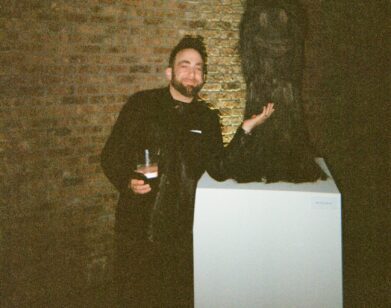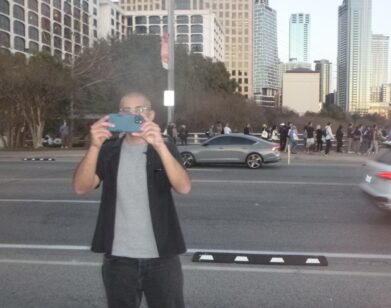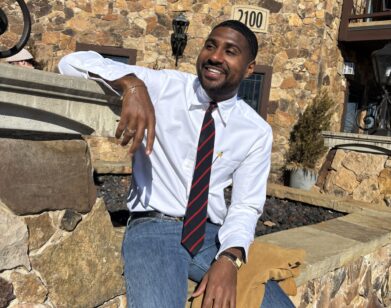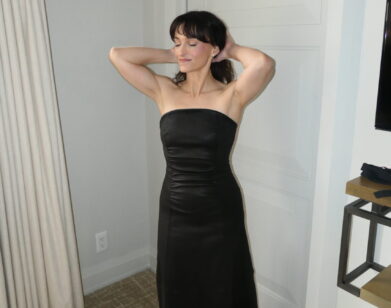Sam Levinson’s Family Feud
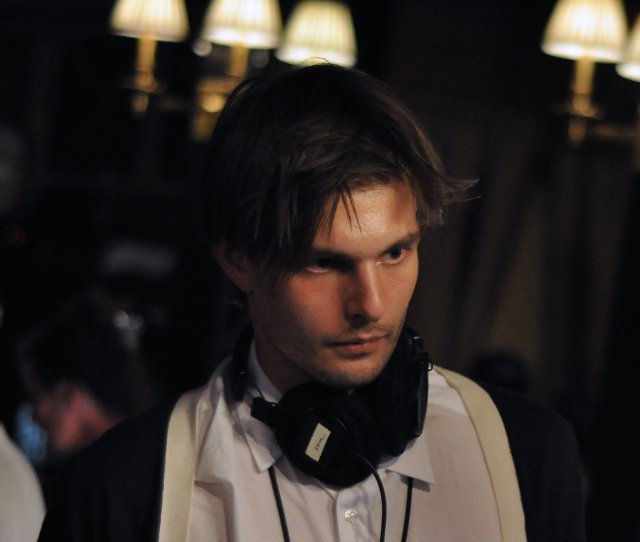
ABOVE: SAM LEVINSON FILMING ANOTHER HAPPY DAY.
Sam Levinson is not interested in making a “comfortable” film, but he made the Sundance Jury comfortable enough to grant him the Waldo Salt Screenwriting Award for Another Happy Day. The 25-year-old first-time writer and director recruited an all-star cast to portray a universal predicament: how the threat of self-implication demanded by reconciliation spoils even the closest of relationships. Ellen Barkin, who also produced, plays Lynn, a maladjusted mother with a fractured family, including substance-abusing Elliot (Ezra Miller) and cutter Alice (Kate Bosworth). A wedding and an ailing grandparent provide opportunities for family bonding, begging Levinson’s essential question: Why is death a more unifying force than love?
Barkin expertly plays the gravitational pull between several layers of familial dysfunction, while Demi Moore provides moments of levity as the second wife to Lynn’s ex-husband (Thomas Haden Church). By situating the middle-aged Lynn and teenage son Elliot at the center of a “coming-of-age” tale, Levinson reminds us that while most people don’t change, the generational transmission of neuroses can be avoided.
A month before Thanksgiving, with all its attendant anxieties, Levinson talked to Interview about how an innocuous “pass the stuffing” can quickly give way to antagonism and dirty laundry.
AMANDA DUBERMAN: You’ve done some acting in the past. Was the shift to screenwriting a conscious decision, or did it start with a certain idea for a project?
SAM LEVINSON: I studied method acting for about four years. I was never interested in acting on film or in television, but I was always more inclined to writing and directing, and the exploration of character. Studying acting helped my writing, and actually really helped me on set in terms of communicating with actors in a very specific way. It’s not what I’m necessarily drawn to, but I felt like, “Okay, I’m working at an ad agency, I’m also going to school—maybe I can make a little bit of money going on auditions and stuff.” I’ve always wanted to write, I’ve always wanted to direct. The conscious decision was always to not be an actor. [laughs]
DUBERMAN: Can you talk about the idea for Another Happy Day?
LEVINSON: I had always had this idea for a film in my head where this woman takes a train down to her parents’ house from New York City to deal with her dying father. At the time I was working on trying to raise money for this documentary feature on Robert Rauschenberg. Right when things were coming together, I got a phone call that he was going to pass away. I got very sad and depressed. I didn’t know what to do or where to turn. I just sat down and this project just sort of poured out of me. I didn’t outline it, I didn’t anticipate anything. I knew there were certain scenes I wanted to touch on—the idea of what one’s intentions are and ultimately what one’s actions are, and the gap between those two. I tried not to put too many parameters on the script and the characters themselves, but allowed them to find their own way.
DUBERMAN: There are some incredibly seasoned actors in the film, which seems like quite a privilege for a first feature. What was the casting process like?
LEVINSON: With this project in particular, I wrote it and then I thought, “Who am I interested in that can play the character of Lynn?” Ellen Barkin just sort of came to me. She’s just so fucking, incredibly talented—in myriad ways. There’s so many paradoxical emotions that flow out of her simultaneously. She was always stuck in my head. I had sent the script to a friend of mine and she said, “This is great, do a rewrite on this other project,” which Ellen was ultimately cast in. After I spent about a week getting to know her, I very meekly handed her the script and said, “Here’s a script I wrote; if you’re interested, I’d love for you to play the main role.” She got back to me about three hours later and just said, “I’m in.” From that point on, she sort of spearheaded the pulling-together of the mechanics.
DUBERMAN: And the rest of the cast?
LEVINSON: I was very lucky with my cast. Not just in the sense of them signing on, but in who they were as human beings on set. I really wanted to create a protective environment. And I think I learned that from studying acting. It’s a really difficult and painful process. Everyone needs to be aware of that. My chief job is to protect that process and let it grow into a performance and not allow any interference with that. It was a very egalitarian environment; no one got anything more than this genius 13-year-old kid Daniel Yelsky [who plays Lynn’s youngest son, Ben].
DUBERMAN: In terms of the protective environment—there are some really volatile moments in the film. Did that affect the atmosphere on set?
LEVINSON: To be honest, it was very calm. In many ways, it was very cathartic for the actors and the crew. We developed such trust in the crew and such trust in the actors that we sort of operated as the most functional version of this family. It was a smooth process despite the emotions and the amount of work we were doing per day.
DUBERMAN: To what extent did the thematic content and the intensity of emotion in the script influence your directing?
LEVINSON: I looked at theater, in the sense that theater is unmanipulated. If I want to pay more attention to one character on stage than another, I can. I think there’s not enough theater in film and not enough film in theater, in a way. I wanted to shoot it in the most objective way possible. That’s impossible, of course; whenever you set a camera down you’re making a judgment. But I knew from the outset I didn’t want it to be in anyone’s point of view because if it was, I would be forcing an allegiance with a character. For the viewer to bring their own emotional baggage to this film, that ultimately creates their experience. In saying “We’re going to create a really wide palette here, we’re going to allow people to look where they want to look,” it ultimately creates this roller-coaster ride where you’re not sure if the fucking wheels are coming off.
DUBERMAN: You mentioned that there is a large ensemble cast, with somewhat equal emphasis on a lot of the characters. For you, who are the main characters?
LEVINSON: In my head, the main characters are Lynn, played by Ellen Barkin, and Elliot, played by Ezra Miller. I say that because I see them as one human being, but the flip side of each other. They’re both hypersensitive to their environment, but they deal with it in very different ways. Elliot tries to numb himself to it, whereas Lynn sort of lunges head first into the pain. I see them as very similar characters. Even though they have only one scene alone together, which is a very violent and volatile scene, the aftermath of it is that you see the two of them expressing, either through words or through their body language, a sort of understanding of how difficult it is to find your place in not just this family, but the universe. How tough it is when you’re defined by your very specific, intermittent action—and how that ultimately becomes an amalgamation of who you are in the eyes of someone else.
DUBERMAN: Lynn seems be the character with the most agency in the family to initiate reconciliation, but she doesn’t really do that. She’s not a hero, but not necessarily an anti-hero, which is kind of uncomfortable to the viewer in terms of making a judgment. With that said, how did you approach her character?
LEVINSON: Just in the way you put it, I think. She’s not a hero and she’s not an anti-hero. I don’t think anyone in this film really is. We operate in a land of ambiguity. The only thing that’s actually in every person, despite their actions, is a very valid inner emotional life that needs to be taken seriously. If we simply react to one another, we never find that line of communication. We never end up connecting. The film is nothing if not a microcosm of what’s going on in this country and this lack of communication that’s going on in Congress. Between the Wall Street oligarchs and the people. There’s no understanding or communication between anyone. We simply react, we don’t investigate.
DUBERMAN: There’s kind of two existential moments confronting this family—the wedding and the illness of the grandfather. How did the two scenarios these influence the action, separately and reciprocally?
LEVINSON: There’s one scene that I think is the thesis statement of the film. Elliot says, “If we came down for a funeral, we might all get along.” He comments on 9/11, and he says, you know, why is it that death and tragedy is a more powerful and unifying force within a family than love? It’s the essential question. I used the illness of the grandfather and the wedding itself to understand the two things. It may be the only autobiographical scene in this film. It’s something that I’ve really struggled with—why is that the case, that death is a more unifying force in a family than love? It’s something that really troubles me personally, because I don’t know why I feel that way. I don’t know if it’s my own psychological makeup, I don’t know if it’s coming of age in this post-9/11 environment. Or just a simple truth that’s existed for centuries. It’s something that really disturbs me. That’s the only scene that is very clear in what it’s saying and the questions that it’s posing. There’s nothing esoteric about it; it’s very straightforward. I’m not trying to bury the lede, which I do in almost every other scene.
DUBERMAN: Conventionally, main characters in a story are often those who experience the most growth in the film. Do you think that Elliot and Lynn “grow” throughout the film, or is there a different message you wanted to project through them?
LEVINSON: Someone gave me script notes on this film right as I was going into pre-production. They said “Well, you know, there’s no arc to the main character.” So I said “That’s the point, there’s no arc.” The reality is, people, for the most part, don’t change. At least with Elliot, you have the hope of growth. With Lynn, I’m not sure, because she is the age that she is, and she’s been doing this her whole life. Whereas, it’s in [the younger character’s] hands to change if they can, and to grow.
DUBERMAN: I think it would betray the tension that’s built up throughout the film, to kind of sell out and have that gratifying reconciliation.
LEVINSON: Then you crush the audience’s imagination. I want the audience to walk out and think, “Is he going to be okay?” If it all comes together, then you walk out of the theater and you say, “Oh, that was all right, let’s go for lunch,” because everything’s been solved. You witness the inception and the death and it was all beautiful and wonderful and it was all solved, and you’ve smoothed over the dirt and everyone hugged each other. I just don’t think that’s reflective of my life, it’s not reflective of anyone else’s life I know. They continue to fucking struggle, they continue to try to change, to try and correct their mistakes. Or they simply don’t give a shit, in many cases, or fail to recognize or understand it.
DUBERMAN: So without a reconciliation, is there a moral to the story here? Does a film need one?
LEVINSON: I don’t think morality plays a role in storytelling, unless you’re looking for a religious experience. I don’t want to make a comfortable film. I’m not interested in that. I’m not interested in answering people’s questions; I’m interested in posing questions. I’m interested in sparking a conversation between two people about what something means. That’s enough for me, as a writer and as a director.
ANOTHER HAPPY DAY IS OUT IN LIMITED RELEASE TODAY.


